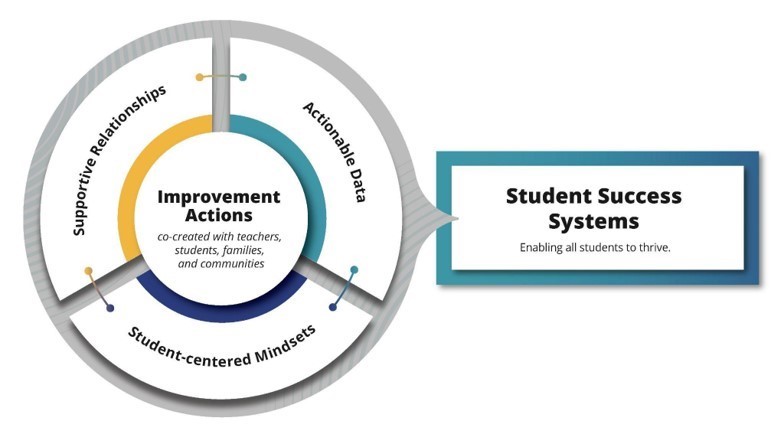Student Success Systems
Student success systems are an evidence-based approach to addressing post-pandemic educational challenges. The four key components help organize a school community to better support the academic progress, career and college transitions, and well-being of all students.
Through the integration of actionable data, supportive relationships, and student-centered mindsets, they enable schools to design and implement systematic approaches to address school-wide achievement patterns and meet individual student needs.
Watch a 35 minute video introduction to student success systems.
High-quality student success systems are:
transformative,
inclusive,
fueled by strong relationships,
guided by improvement science, and
shaped by student-centered mindsets.
Student success systems provide schools with a unified system that integrates, extends, and increases the capacity of existing student support efforts, including early warning, on-track, and multi-tiered support systems.
High-quality student success systems combine four essential elements so that secondary schools are empowered, in an inclusive way, to graduate all students on a pathway to adult success through higher education and job training. The framework enables school teams to integrate measures of well-being, belonging, and connectedness with real-time, research-based predictive indicators of academic success. Combined with teacher, school staff, student, and family/caregiver insights, measures drive supportive actions and improvements to propel student success.
Two-page definition download (.pdf)

Student Success Means All Students
As one of the organizing partners of the GRAD Partnership, the National Center for Learning Disabilities (NCLD) is committed to ensuring student success systems are informed by the research on and lived experiences of students with disabilities.
The Four Essential Elements of High-Quality Student Success Systems
Click through the tabs to learn more.
Strong, Supportive Relationships
High-quality student success systems build upon and strengthen supportive relationships. Four types of supportive relationships provide the foundation for student and school success – school adults and students, students and students, school adults and school adults, and school adults and parents/caregivers. These relationships depend on a school culture of belonging where everyone feels validated, accepted, affirmed, and treated fairly. Read more about this component, including tips and resources for developing and strengthening supportive relationships in your school.
See also:
- School Connectedness: Strategies for Increasing Protective Factors Among Youth (CDC, 2009)
- Watch a short video about strategies to build relationships between students and teachers.
Real-Time, Actionable, Holistic Data
School teams need access to research-based, predictive indicators that are continually available at the student and teacher level throughout the year, in as real time as possible. Read more about this component, including tips and resources for focusing on data in your school.
Strategic Improvement Actions
Student success systems use regular assessments of holistic data to develop strategic action that is student-centered, adapted to local context, and involves students, teachers and community members. An adaptive analysis, response, and improvement system is supported by professional learning, frameworks and/or protocols that enable teams of adults who are connected with students to work collectively and regularly to co-design improvement efforts. Actions and supports can be at the district, school, grade, classroom, student sub-group, or individual level. Read more about this component, including tips and resources for focusing on strategic improvement actions in your school.
See also: A Pathway to Change: Implementing effective systems to support all students.
Student-Centered Mindsets
Student success systems, and the actions student success teams co-create with the school community, are fueled by a shared set of student-centered mindsets. These mindsets are the foundation of the shared understanding behind why student success systems are needed and valued by the school community. They both propel student success systems and are shaped by them. Mindsets cannot be mandated – they arise through dialogue, reflection, and shared experience. To best support students, all the adults in the building need to share a common set of attitudes and beliefs that respect the whole child. Read more about this component, including tips and resources for building and deepening shared mindsets in your school.
See also: A Pathway to Change: Shifting Mindsets to Support All Students
Putting success into practice
Student Success Teams
Student success teams are a group of adults who work together on a regular basis to implement and continually improve a student success system. The size and composition of student success teams will vary based on school size, and the scale and scope of students who need adult actions to succeed and thrive in school. Typically, they will include teachers, counselors, school leadership, and others in student support roles. They also use an organized structure for soliciting insights and participation from students, parents/caregivers, and the community. In critical grades (e.g., 6th grade, 9th grade, 12th grade) and when schools are large or large numbers of students need additional adult action to succeed, grade-level student success teams may be needed.
Evidence and experience suggest that to be highly effective, student success teams need:
- Regularly scheduled time to work together during the school-day on, at minimum, a bi-weekly basis
- Easy access to student-, classroom-, and grade-level attendance, course performance, and well-being data (e.g., sense of agency, belonging, and connectedness)
- Clearly defined roles and responsibilities that are distributed across the team (e.g., data person, note keeper, timekeeper, action tracker, etc.)
- Ability to take action to support students and to advocate for changes to school practice and policy. This usually requires the active participation and support of school leadership.
- Shared set of norms that support continual reflection and improvement, seeking perspectives and voice from a wide range of stakeholders, and building the team’s capacity for listening, openness, empathy, and patience.

